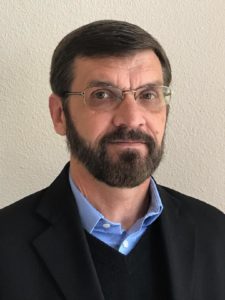Some of the theological differences between Baptists and Methodists are significant.
Think infant baptism, as an example.
But such differences needn’t bar clergy and churches in the two traditions from cooperating in ministry, especially when it involves poverty, hunger and human suffering along the U.S.-Mexico border, said Rick McClatchy, field coordinator of the Cooperative Baptist Fellowship in Texas.

Rick McClatchy
It’s why McClatchy this year initiated a series of Baptist-Methodist talks around the Lone Star State in cooperation with Fellowship Southwest and the United Methodist Church.
Sessions have already been held in Fort Worth and San Antonio with the next gathering planned for Feb. 20 at Baylor University’s George W. Truett Theological Seminary in Waco. More will convene in the Fall.
Participants in the previous discussions laid the groundwork for cooperation after finding ways through theological differences – including infant baptism.
The small-group portion of the talks uncovered similarities between the Methodist ritual and parent dedications practiced in Baptist churches.
“A lot of times they look pretty similar because in both services the parents and the church dedicate themselves to raise this child in a Christian environment,” he said.
McClatchy shared further about the process with BNG. His comments are presented here, edited for clarity.
What inspired these conversations, especially at a time when CBF Texas is so heavily engaged at the border?
The initial thought for doing it came out of the Baptist World Alliance meeting I attended this summer in Bermuda. The BWA and the World Methodist Council had been doing some dialogue and produced a workbook that would help congregations dialogue with each other. So, we thought we would have some regional conversations in various places in Texas.
Have you been involved in ecumenical dialogue before?
When I was with (CBF Oklahoma), we became a part of the Oklahoma Conference of Churches. And in Texas here, (CBF Texas) decided to become a part of Texas Impact, which is an ecumenical and interfaith organization that does advocacy work on public policy issues here.
What’s the practical value of such interactions?
The first thing is just to understand other religious groups. The second thing is, we try to do it in more of an appreciative way by looking for what can we learn from the other groups that can enrich our own faith and understanding. The third thing is we hope to build relationships that will enhance greater cooperation between our churches.
That seems to tie back into your work at the border and other ministry areas.
It’s a long-term strategy for building better cooperation. That’s important because churches are increasingly challenged to have enough resources to do ministry the way they used to. We really need to work with other people to make our resources go farther nowadays.
Why do the sessions break into small groups?
There have to be working relationships between churches and denominations to make that kind of cooperation occur. People need to know each other and trust each other first. We saw this with the Pentecostals we have worked with along the border. They were very leery about working with us Baptists at first, but when they realized we were there to help and not trying to make them stop being Pentecostals, they were very happy. I think the future is going to look more this way.
What have the groups appreciated about one another’s traditions?
For the most part Baptists talked about the inspiration John Wesley provided in fostering evangelism. Baptists also said they appreciated that Methodists are often ecumenical leaders in their communities. Some of them had a real appreciation for the Wesleyan Quadrilateral: scripture, tradition, reason and Christian experience.
Is cooperation already occuring?
In San Antonio one of our Baptist churches has a lot of community outreach efforts and several of the Methodist ministers afterward said we need to set up a time to go and learn more about what they are doing. Already there is some idea-sharing going on. But with this kind of dialogue we are not going to see change in the next two weeks. It’s a long-look strategy. You have to keep pushing forward.
Did the divisions over LGBTQ issues in the United Methodist Church come up in discussions?
It was alluded to a little bit by some of the Methodists, that they are in the midst of a denominational struggle. It shifted to a larger conversation about the different forms of polity we have as Baptists and Methodists. But both sides could see challenges inherent in each of the forms. Our independence as Baptists can work against us when predatory people take advantage of us. As we talked about some of the struggles each group is dealing with, we could see there were some pluses and minuses in both structures.


